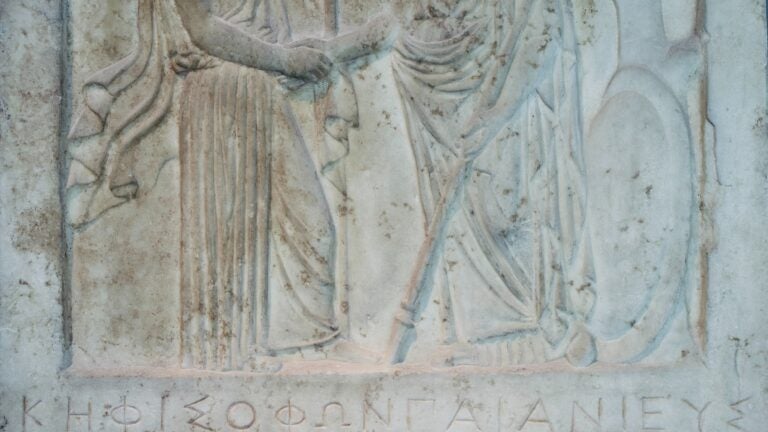
Study of classical Greek opens up exciting vistas of discovery on the ancient Mediterranean world. Within just three semesters, students can begin to read the works of Homer, Sappho, Plato and much else in their original form. Our earliest works of tragic drama were composed in Greek, as were influential works from antiquity in the areas of philosophy, rhetoric, history, political thought and the sciences. With the spread of Greek culture in the era of Alexander the Great, Greek became the language of administration and intellectual life in communities across the Aegean world and much of the Near East; for instance, in Jewish literature of the second temple period and much early Christian thought.
Study of Greek and Latin in each case provides valuable tools for understanding languages generally, with benefit both for learning new foreign languages and for deepening understanding of one’s own language with improved clarity and precision. Students learn to read texts closely and analytically, and to situate them culturally and historically. Attention to the rhetorical and aesthetic features of texts helps students to develop written and oral communication ability, and study of the languages generally helps students to cultivate tools of critical thought and problem-solving skills. Students with knowledge of Greek and Latin also have been shown to perform exceptionally well on graduate entrance exams such as the LSAT and GRE.
The Major
Minors
Study Abroad
USC offers students an amazing array of opportunities to spend a semester studying abroad. Students who have participated in these programs regularly claim that living and learning in a foreign country gave them an entirely new perspective by experiencing classical monuments and historic places in person.
Rome- Italy
The Intercollegiate Center for Classical Studies in Rome (the “Centro”) offers a unique experience for serious undergraduate classics majors to experience ancient Rome first-hand. The core of the program is an intensive course on ancient Roman topography, history, art and architecture. This course is taught in a combination of classroom lectures, site visits (frequently with “behind the scenes” access to areas tourists don’t get into), and fieldtrips outside Rome proper (e.g. Tuscany, Pompeii, Sicily). Centro students also take courses in Greek, Latin, Italian and/or Renaissance/Baroque art history.
Courses
For the courses offered during any given term, consult the Schedule of Classes.
-
GR 120: Greek I
Essentials of classical Greek grammar and vocabulary.
GR 150: Greek II
Essentials of classical Greek grammar and vocabulary, continued. Basic reading skills.
GR 220: Greek III
Reading Greek literature. Introduction to reading and translation of classical Greek prose and poetry. Extensive grammar review.
-
GR 355: Aristophanes
A study of at least three comedies.
GR 362: Homer and the Greek Epic
Selections from the Iliad and/or Odyssey. Problems of oral composition and transmission.
Senior Classical League
The Senior Classical League (SCL) at the University of Southern California is an academic community established to enhance the study of Classics outside the classroom. We aim to challenge our fellow undergraduates to take learning into their own hands, to become involved thinkers and intellectual contributors, both in Los Angeles and the larger society. We strive to create an environment on campus that provides opportunities for students to experience Latin and Greek as living languages. Among the events we organize are group readings of primary sources, cultural excursions, and academic enrichment opportunities. – USC Classics Department
“Some of our most exciting events from last year have been trips to the Getty Villa in Malibu and volunteering at Junior Classical League events. We also hosted a trivia event with UCLA, providing social opportunities for Classics majors from both schools”.

Department of Classics
Explore engagement opportunities, clubs, workshops, panels, and more on the USC Department of Classics website.
Fellowships, Scholarships and Awards
The USC Department of Classics offers a wide range of fellowships, scholarships and awards to support students’ academic goals.
Faculty
Meet the faculty and staff of the Department of Classics who are eager to guide you throughout your language learning journey!



